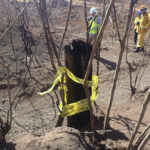Three Toyota officials are under a criminal investigation on suspicion of professional negligence in allegedly shirking recalls for eight years and not fixing a defect that may have caused an accident, Japanese police said July 11.
Toyota Motor Corp. denied the officials had engaged in any wrongdoing. The automaker said in a statement it was cooperating fully with the investigation.
Kumamoto police in southern Japan filed papers to prosecutors, a police spokesman said. Accused are three Toyota officials, ages 62, 58 and 55, overseeing quality control at the automaker, he said.
Their names have not been disclosed. Toyota said at least one of the officials had left the company, although reasons for the departure were unclear.
Five people were injured in an Aug. 12, 2004, in Kumamoto in a head-on crash when steering failed in a Toyota Hilux Surf sport utility vehicle, causing it to swing out of control into the wrong lane. One person in the other vehicle suffered injuries requiring 52 days of treatment, while four suffered more minor injuries, police said.
Toyota said a recall was carried out in October 2004 for 330,000 Hilux Surf vehicles manufactured between December 1988 and May 1996. The recall was for a problem part used in the steering system that could break, according to Toyota.
Toyota said the vehicle involved in the accident was manufactured in 1993.
Toyota had received five reports of problems with the steering by 1996, but the problems were limited to repeatedly turning the wheel during parking, and no recall was made then, it said. After additional problems were reported in 2004, Toyota carried our another investigation and decided to carry out a recall.
Details on recalls on similar models sold overseas were not immediately clear. The Hilux Surf is similar to the model sold as the 4-Runner in the U.S.
A Toyota official, speaking on condition of anonymity, quoted police as saying that reports about problems began in 1992, and company officials are accused of being aware of them as early as 1995 or 1996.
The automaker, based in Toyota city, central Japan, said it will continue to make quality a priority.
“We will continue to strengthen quality control under our belief that we must put the customer first and make quality No. 1,” it said in the statement.
Toyota has been reporting booming sales in recent years and is growing so rapidly some analysts expect it to overtake struggling General Motors Corp. of the U.S. as the world’s biggest automaker in coming years.
But Toyota, known worldwide for impeccable quality, has suffered somewhat of an image problem lately because the number of recalls in has soared, raising doubts whether the automaker can continue to maintain quality standards as it embarks on the next step of global expansion.
A massive scandal in Japan involving recall cover-ups took a huge toll on Mitsubishi Motors Corp., which has booked its third straight year of losses for the fiscal year ended in March. In 2000, Mitsubishi Motors acknowledged it had been systematically hiding auto defects from authorities for more than two decades.
The automaker has announced a spate of recalls since then, and disclosed in 2004 it had failed to come clean in 2000 and had more concealed defects, some of which have been linked to fatal accidents.
Was this article valuable?
Here are more articles you may enjoy.

 Travelers Survey: Distracted Drivers Making US Roads More Dangerous
Travelers Survey: Distracted Drivers Making US Roads More Dangerous  Hawaiian Electric Hits 40-Year Low Ahead of Maui Fire Report
Hawaiian Electric Hits 40-Year Low Ahead of Maui Fire Report  CoreLogic Report Probes Evolving Severe Convective Storm Risk Landscape
CoreLogic Report Probes Evolving Severe Convective Storm Risk Landscape  Viewpoint: How Generative AI Enables a Brighter Claims Future in 2024 and Beyond
Viewpoint: How Generative AI Enables a Brighter Claims Future in 2024 and Beyond 